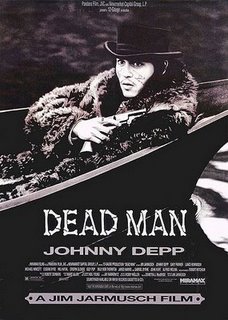
DEAD MAN
US, 1995, 120 minutes, Black and white.
Johnny Depp, Crispin Glover, John Hurt, Robert Mitchum, Mili Avital, Gabrielle Byrne, Lance Henriksen, Michael Wincott, Gary Farmer, Iggy Pop, Billy Bob Thornton, Jarrod Harris, Alfred Molina.
Directed by Jim Jarmusch.
Johnny Depp has emerged during the last five years as a strong acting talent, an actor who tends to choose offbeat and non box-office roles rather than mainstream movies. When one considers his performances in, for instance, Edward Scissorhands, What's Eating Gilbert Grape, Don Juan de Marco and Ed Wood, we see has built up an interesting film list.
Dead Man is a striking film that will please buffs but will probably be too slow-moving and boring for action audiences. It is written by Jim Jarmusch, whose small-budget but acclaimed films include Stranger Than Paradise, Down by Law.
This film has been shot in striking black and white photography. A young man, seemingly in search of a job, takes a train ride out west and comes to the end of the line (literally). Instead of getting his position, he becomes the victim of a diabolical boss and three murderous henchmen.
As he escapes through the wintry landscapes he befriends an Indian who teaches him wisdom and survival - and enables him to kill his pursuers. While using familiar conventions from the westerns (including Robert Mitchum at almost 80 as the boss), this is a journey with a dead man, a man going through a kind of purgatorial pilgrimage.
The ads say that it is `uncut'. There was hullabaloo at the end of 1995 when a five second scene led to the film's being refused a certificate. This seems an over-reaction. You would be hard put to consciously notice the scene unless warned. It indicates the hell town the traveller finds himself in. Intriguing, if violent, allegory.
1. The reputation of Jim Jarmusch, critical acclaim? Controversies about this film, its themes and treatment?
2. The black and white photography, the creation of an atmosphere, monochrome? Light and darkness? For the American west, for a kind of purgatorial journey? Neil Young’s score?
3. The title, the emphasis on dead, William Blake and his being dead or alive, going on a journey into death?
4. The opening with the train, Machine as its destination, the irony of the title? The passengers on the train, the range of people, the 19th century, dress and décor?
5. William Blake, Johnny Depp’s screen presence? The little man, prim, Patience? The train guard and their interactions, about the boat and the moving landscape? Coming from Cleveland, his recently deceased parents, not having a wife or fiancee? The train guard saying that out here was a road to hell? Going to the end of the line? His being an accountant? The information about Machine, no trust in Dickinson and his factory? The arrival, finding the grave? The shooting buffalo and the office – and his fear?
6. The portrait of Machine, houses, streets, offices? The end of the line, bones, people, potholes, animals, hunters, sex in the alleyways? The grotesque aspects of the town?
7. Dickinson and his squalid office? Robert Mitchum and his screen presence, age, talk? John Hurt as the accountant? The visuals of the factory, the office, the hunting trophies, Dickinson being gruff? The issue of hunting and the gun?
8. The accountant, his rejecting Bill Blake, laughing at Bill and his concerns about Dickinson?
9. Bill moving into the hotel, the whisky, Thel and his defence of her, in bed, the confrontation, his shooting Charlie Dickinson, his having to flee?
10. Thel in the mud, the drinking, the flowers, the bed and the gun, Charlie, his character, son of Dickinson, death?
11. Billy being shot, the question whether he was dead or not? His going out on his journey into the countryside? Nobody and his treatment of Bill, not being able to get the bullet, it being near Bill’s heart? His experience with Nobody (Nobody as an Indian angel)? The rituals? His accompanying Blake on his journey, his guns, the pursuit by the marshals? The confrontations, the killing of the marshals? The rituals, the fast and the visions? A vision quest ? The continued journey and its dangers?
12. The world of the Indians, Nobody and his talk, his having travelled to England, his education, being rejected by his fellow Indians? The tobacco, the knife, the feathers? Language? His role in bringing Bill to life, Bill reacting to his name, his being a true dead man? Quoting Endless Night?
13. The flashbacks about the spirits, the soldiers, jail? The cities and the people moving? Blake and his escape? Seeing the skulls, painting Blake? His thinking about Blake and saving him?
14. The three gunfighters, in the office, drawing their guns, being employed by Dickinson, their task, the travel? The shooting of the boy? The marshals? The personalities of the gunfighters? The cannibal gunfighter? His malice, killing the other two, devouring them?
15. The range of travellers, men and women? The stories about the killings? Bill, his clothes, the train?
16. The marshals, the image of western marshals, their task, the horses and the riding?
17. The continued journey to the land where the spirit belongs? Where the sea meets the sky? What destiny? The visuals of the goal of the journey?
18. The trading post missionary, his shop, refusing to sell tobacco, his racism? His religious hatred and comments about the heathens?
19. The vision of Christ, “Thou dost see in my greatest enemy…”?
20. The final shooting, the canoe, the Dead March, the two shot dead, the gunfighter and Nobody, dying on the shore, Bill Blake and his sailing out on the water – to a final destiny?
21. The philosophical implications of the film? About human nature, responsibility, sin and forgiveness? Charity and care? The theological implications about the nature of death, purgation, Heaven or Hell?